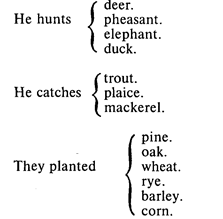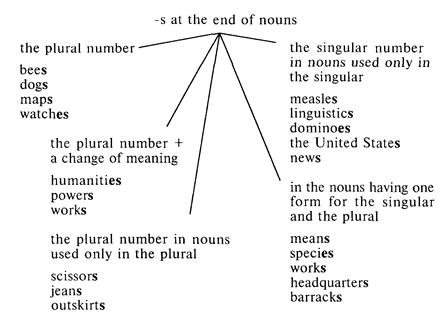Учебное пособие: Консультации по английской грамматике В помощь учителю иностранного языка
The following collective nouns also called nouns of multitude are used with the plural verb only: cattle, clergy, gentry, people, police, poultry, vermin, youth. Reference to individual members of the group is made thus: twenty people, fifty police or fifty policemen, ten head of cattle.
Many collective nouns exist for groups of animals and birds:
a covey of quail — выводок, стая куропаток;
a flock of birds, chickens, geese, pigeons — стая птиц, цыплят, гусей, голубей;
a herd of cattle, sheep, cows, goats, deer— стадо скота, овец, коров, коз, оленей;
a hive of bees — улей пчел;
a pack of dogs, hyenas, wolves — свора собак, стая гиен, волков;
a pride of lions — стая львов;
a shoal of herring, mackerel — косяк сельдей, скумбрий;
a swarm of ants, bees, flies — рой муравьев, пчел, мух.
Some nouns expressing animals, birds and fish keep the singular form in a collective plural meaning:

EFL teachers should teach their students to differentiate between nouns with -s at the end. -S marks the plural number in countable nouns and nouns used in the plural and may be part of the stem of the noun (which in some cases developed from the former plural number) that may be a marker of the plural number or not.
On other hand, the absence of -s at the end of the word is not necessarily a marker of the singular number.

One other problem in connection with number of nouns should be given considerable attention to in the teaching process. This is concord or agreement between forms of the subject-noun and the predicate-verb. The general rule is well-known: the subject-noun in the singular requires the predicate-verb in the singular and the subject-noun in the plural requires the predicate-verb in the plural if the verb form admits of the expression of the singular and the plural. In other words, if the subject is a singular proper name, a singular common noun, a mass noun, or a third person singular pronoun the third person singular inflection is used with the predicate-verb in the present tense or the form "was" is used for the past tense if the verb "to be" is required by the sense. No inflection is used in the present tense and the form "were" in the past (if it is required by the sense) with subjects proper or common plural nouns, or plural pronouns. However, there are many special and difficult cases concerning this rule.
1. Collective nouns can take either a singular or plural inflection depending upon the meaning:
government has
have
crowd it, they
committee itself its which was
themselves their who were
2. Special care should be taken when the learners deal with nouns ending in -s, since, as is known, they can be considered to be either singular or plural:
No news is good news.
The scissors are on the table.
3. "A number of N" takes the plural, but "the number of N" takes the singular.
4. Fractions and percentage take the singular verb when they modify an uncountable noun and the plural when they modify a countable noun; either a singular or plural verb may be used when they modify a collective noun:
Thirty per cent of water is wasted nowadays.
Thirty per cent of books were sold out.
Thirty per cent of population was/were present.
5. Plural unit words of distance, money, time, etc., take the singular: